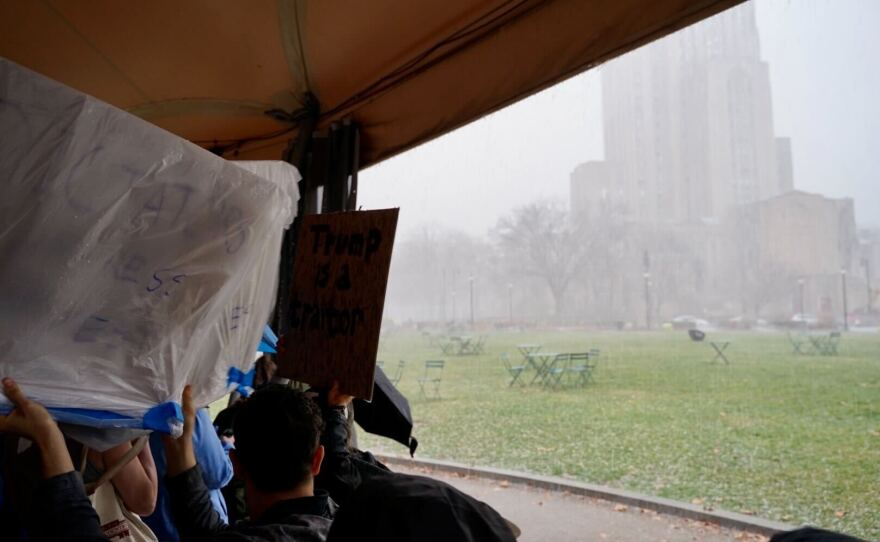Despite thunder, hail and tornado watches, hundreds of Pittsburghers rallied in Oakland on Sunday against changes being made by the Trump administration to the country’s educational landscape. The protest was notable both for the broad swath of residents that it attracted, as well as the divisive rhetoric of one of its speakers.
In addition to the many retirees who have been regularly showing up to protest the Trump administration in recent weeks, Sunday’s protest featured parents advocating for their young children’s education, college and graduate students upset about how their educational experiences have been impacted, as well as education professionals themselves.
While the vast majority of the speakers at Sunday’s event drew widespread cheers, one speaker did not. Pittsburgh Public Schools board member Yael Silk accused progressives in the crowd of not standing up for Jewish students during the Gaza protests last year, some of which took place at the very same spot Silk was speaking.
“Over the past year, when Jewish students were harassed, beaten, and driven out of classrooms, so many people who claim to fight for justice stayed home and stayed silent,” Silk said.
After a couple minutes, Silk’s speech drew an increasingly large smattering of boos and shouts of “Free Palestine.”
Tracy Baton, one of the lead organizers of the event, said Silk’s speech took attention away from what the organizers had planned to focus on.
“I think getting off-message was a problem because we weren't focused on schools,” she said.
A broad coalition
The protest on Sunday drew together a variety of education supporters, who huddled tightly together under the large tent in Schenley Plaza.
Don Alexander, who teaches social and emotional learning to K-6 students in the Carlynton School District, is worried about cuts to the U.S. Department of Education, as well as the administration’s harsh rhetoric against some groups of students.
“As a teacher who has many students who are immigrants and refugees, I feel like — if we don't stand up now — that those students are going to have a very difficult future in our country,” he said.
Jenny Tieman has a child in public schools and is worried about how recent cuts will impact the ability to prepare the future workforce. “Education is one of the key components to equity and for people to have a livable wage,” she said.
Joelle DeLucia, a second-year student at Chatham University, said Trump’s actions have created uncertainty at her school. She said because of spending cuts, the lab she works in to help improve the attention span of young students could lose its funding.
“We now have to keep in mind that we might just come in one day and our research will just completely not happen,” she said.
June Wearden, a barista at Carnegie Mellon, said education was the one issue that should pull everyone together.
“The people that are in our schools will be the people that are our workers in the future — nurses, doctors, engineers, construction workers, electricians,” she said. “Everybody's getting educated, and so it's really important to stand up for them.”
A divided message
As thunder, heavy rain and hail pounded Schenley Plaza, the protesters huddled together under a tent to hear speeches and wave their signs.
But while the weather pulled the protesters closer together physically, Silk’s speech pulled some of them apart.
Speaking over the shouts in the crowd, Silk said that the Trump administration was using the pro-Palestinian protests at Columbia University as a pretext to subvert democracy.
Earlier this week, the Trump administration detained Mahmoud Khalil, one of the university’s lead pro-Palestinian organizers, without charging him with a crime and despite Khalil’s status as a permanent legal resident.
“While the far right cheers for deportation, some on the left are calling for his immediate release. Both are wrong,” Silk said. “The choice is not between deporting Khalil or freeing Khalil, the choice is due process for all.”
Tim Shaffer, one of the protesters at the event, complained that Silk was off-topic.
“If she's going to speak about Jewish individuals, she should be speaking about the Palestinians that have also been affected,” he said. “We understand the Jewish people's plight, but we should also understand the Palestinians' plight.”
Silk’s speech did make a plea for the movement to unify. “If we are going to fight for the democracy that is worthy of our children, then we need the biggest, messiest, most complicated of pluralist tents,” she said. “A tent that is big enough to hold the belief that all marginalized groups are worthy of self-determination, including Jews.”
But to Shaffer, this effort at inclusion was undermined by her emphasis. “If you wanna say plurality, say their names, say the Palestinians,” he said. “Don't just focus on one and then say plurality.”
Previous protests against the Trump administration in Pittsburgh the past two months have often included a diverse set of issues and causes, including support for immigrants, Urkanians, trans-rights, and criticism of Trump’s sweeping cuts to higher education and the federal workforce. But none of those various messages appeared to be in conflict during those demonstrations.
Israel’s war in Gaza has divided Democrats across the country, including Pittsburgh’s political elite, with leaders like Sen. John Fetterman and Rep. Summer Lee, each taking a sharply different tack when it comes to talking about the 16-month-old conflict.
Baton, one of the main organizers, said she didn’t vet Silk’s speech and said that they would continue their policy of trusting their speakers. But she said, “We sometimes change how we organize with people if they can't stay focused on the message.”











